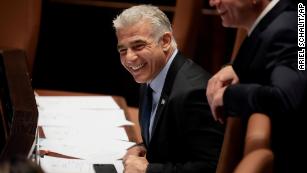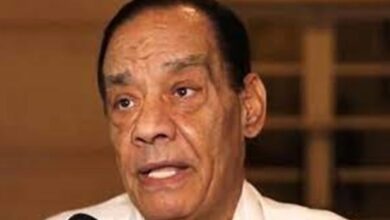
Jerusalem (CNN)Yair Lapid is used to being in the spotlight.
The son of a prominent family, Lapid has dabbled in acting, screenwriting, music and even amateur boxing, before becoming best known to the Israeli public as a journalist-turned-politician.
Now Lapid will be entering his biggest spotlight yet — as Israel’s caretaker prime minister.
Lapid officially took over as caretaker prime minister on Friday after the country’s parliament, the Knesset, passed a bill to dissolve itself a day earlier.
He’s now preparing for elections, trying to keep former Prime Minister Benjamin Netanyahu from climbing back to power.
A media celebrity
Despite his brief acting foray, Lapid became a mainstay in Israelis’ living rooms through the news. After briefly working as a print journalist, he made his way on to television in the mid-1990s, hosting one of the biggest talk shows of the era.
But in 2012 Lapid changed course following in the footsteps of his journalist-turned politician father. He created a new political party, dubbed “Yesh Atid” (There is a Future) and positioned himself as the centrist voice of the middle-class Israeli, focusing on domestic issues. He promised to tackle housing costs, end exemptions from the military draft for the Ultra-Orthodox, and to legalize same-sex marriage.
“What unites all of (our supporters) is that they said yes for hope and yes for mutual responsibility and yes to the fact that the truth is not being held in any side,” Lapid said at the time.
A centrist for all
In his first campaign, Lapid tried to portray his party as one all Israelis could be part of, even unveiling his diplomatic platform from a settlement in the occupied West Bank. He supports an independent Palestinian state, but says East Jerusalem shouldn’t be its capital. He opposes new settlement construction but says large existing settlement blocs should always be a part of Israel.
“Yair Lapid is the quintessential product of Tel Aviv, of Israel’s main secular city, its main business and culture center, center of nightlife and so on,” Anshel Pfeffer, a correspondent for Haaretz and The Economist, told CNN’s Christiane Amanpour.
“Many Israelis, including Israelis who were close to his centrist perhaps leaning leftward politics and views, including many of my colleagues in Israeli media, didn’t take him seriously. They thought he’s a performer, he’s a presenter, there’s no real substance there, this will be a passing phase.”
But Lapid’s party shocked the Israeli political establishment by winning 19 seats in the 2013 elections, second only to Netanyahu’s Likud party. Lapid was dubbed Israel’s new political star, and Time Magazine named him as one of 2013’s “100 Most Influential People.”
He joined then-Prime Minister Netanyahu’s government as finance minister but was fired within less than two years and became one of the opposition’s top voices.
The most diverse coalition
In 2021 after four inconclusive elections in two years, it was Lapid who was the architect of the coalition that would ultimately oust Netanyahu and end his run as Israel’s longest-serving prime minister.
Pulling together parties from across the political spectrum, from the far left to those on the right, and even including the first Arab party in to sit in a governing coalition — the new government held a one-seat majority.
But it came at a cost to Lapid’s own political ambitions. As part of the deal to bring the right-winger Naftali Bennett on board as prime minister, Lapid would only take over after two years.
“Lapid brought together this very unwieldy, almost unimaginable, unprecedented coalition of eight parties (and) managed to get them all to vote for Naftali Bennett as prime minister, managed to maintain them for an entire year, and above all for many Israelis he is now the only man in the last 12 years to beat Netanyahu — that by itself is a big achievement,” Pfeffer said.
Lapid was appointed foreign minister, where he traversed the globe meeting with world leaders and, notably, Israel’s new Arab-state allies. It was Lapid who hosted the historic Negev summit, where the top diplomatic representatives from the United Arab Emirates, Bahrain, Morocco, Egypt and the United States met in southern Israel for the first time in March 2022.
But ultimately it was the coalition’s ideological diversity that was also the source of its fragility. It lost its parliamentary majority when two members of Bennett’s own right-wing party defected. And when some left-leaning members refused to support a recurring bill that among other things, gives Israeli settlers in the West Bank the same civil rights as citizens in Israel, the coalition reached a political impasse.
In a shock move, Lapid and Bennett announced last week they would dissolve their own government and trigger new elections, making Lapid interim prime minister.
Standing together in a show of solidarity, Lapid told Bennett “I love you,” a moment of outward bromance that surprised many in the Israeli media.
Lapid will be the first non-right-wing prime minister of Israel in more than a decade. He now has four months to convince the public he should keep the job. Elections will be held on November 1.




